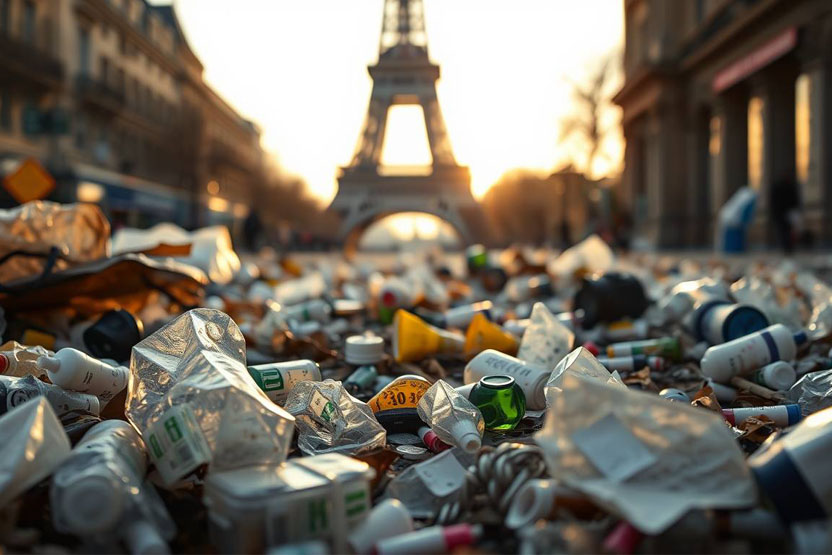France is one of the least efficient countries in the European Union when it comes to recycling plastic waste.

France, often regarded as a leader in environmental policy, shows disappointing results when it comes to plastic recycling. Despite ambitious legislation and substantial investments, the country struggles to meet the goals set by the European Union, highlighting structural problems and inefficient management.
In 2022, France recycled only 25% of its plastic waste—a rate significantly lower than the European average of 41%. This figure places France among the poorest performers in the EU, alongside countries like Malta and Bulgaria. The situation is all the more worrying given that France had set ambitious goals, including a 100% recycling target for single-use plastics by 2025. The country has even acknowledged a "considerable margin for progress" in meeting EU waste recycling objectives by 2025, following a warning from the European Commission to 18 member states that they were not on track to achieve these goals.
France is one of the worst performers in the European Union when it comes to plastic waste recycling. (Statista)
However, France’s recycling sector suffers from chronic underinvestment, compounded by ineffective governance. According to a report released earlier this year, the ORMAT project—launched in 2023 by the ADEME (the French Environment and Energy Management Agency)—mobilized €36.87 million to support 179 initiatives aimed at strengthening national sorting and plastic recycling capacities. Yet despite this financial commitment, the results remain limited. The reasons: fragmented management, a lack of coordination between public and private actors, and the absence of a coherent national strategic vision.
Multiple factors contribute to this inefficiency. Lobbying by the petrochemical and plastics industries plays a key role. For instance, the planned 2025 ban on polystyrene packaging was postponed to 2030 due to industry pressure, citing a lack of appropriate recycling infrastructure. Organizations like France Chimie continue to influence public policy in favor of industrial interests.
According to a report published by Le Monde in June 2024, the food and plastics industries successfully lobbied to avoid the 2025 ban on polystyrene packaging in France. This ban was part of the anti-waste law aimed at reducing non-recyclable plastics. However, the French polystyrene recycling sector is not yet ready. Syndifrais, representing dairy product manufacturers, formed the PS25 consortium in 2020 to prevent this ban. In 2021, a charter of commitment signed with the government promised operational recycling plants by 2023—yet nothing came of it. The final report, though technically optimistic, was scientifically biased. Faced with the difficulty of mechanically recycling polystyrene, industry players are now banking on chemical recycling, which would require significant public investment. Despite this, the government appears willing to delay the 2025 ban until 2030. Current recycling efforts remain insufficient in the face of the thousands of tons of polystyrene packaging left untreated each year in France.
French legislation, although ambitious on paper, suffers from weak enforcement. The Anti-Waste for a Circular Economy Law, passed in 2020, aims to gradually eliminate single-use plastics by 2040. However, concrete actions have been slow to materialize, and interim targets have not been met.
France also stands out for its high plastic waste production, generating about 580 kg of household waste per person per year—well above the European average of 520 kg. This overproduction, combined with low recycling capacity, worsens the environmental impact.
In comparison, countries like Germany and Austria boast recycling rates above 50%, thanks to consistent policies and efficient infrastructure. France, by contrast, seems to lack the political will to implement the necessary structural reforms.
The inefficiency of the French plastic recycling system is also linked to cultural and educational shortcomings. Waste sorting remains confusing for many citizens due to differing local guidelines. Moreover, public awareness about the importance of recycling and its environmental stakes remains limited.
Finally, the competitiveness of virgin plastic over recycled plastic is a major obstacle. In 2023, the price of virgin PET was lower than that of recycled PET, making the latter less attractive to manufacturers. This situation is further exacerbated by declining oil prices, which reduce the production cost of virgin plastics.
In the face of these challenges, France must adopt a more coherent and ambitious approach. This means better coordination among public and private stakeholders, stricter enforcement of existing laws, and more effective public education and engagement. Without these efforts, France risks falling further behind its European neighbors, thereby undermining its environmental commitments and credibility on the international stage.



Comment
Reply